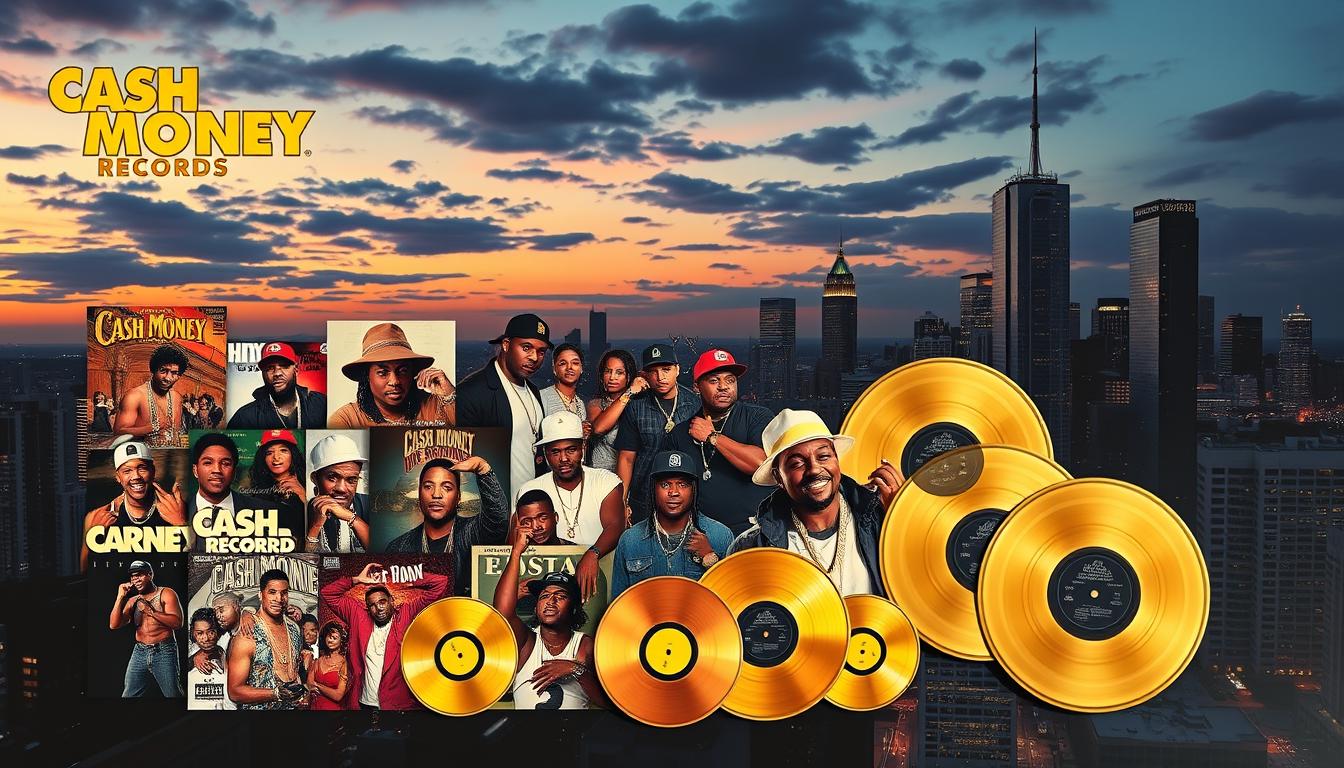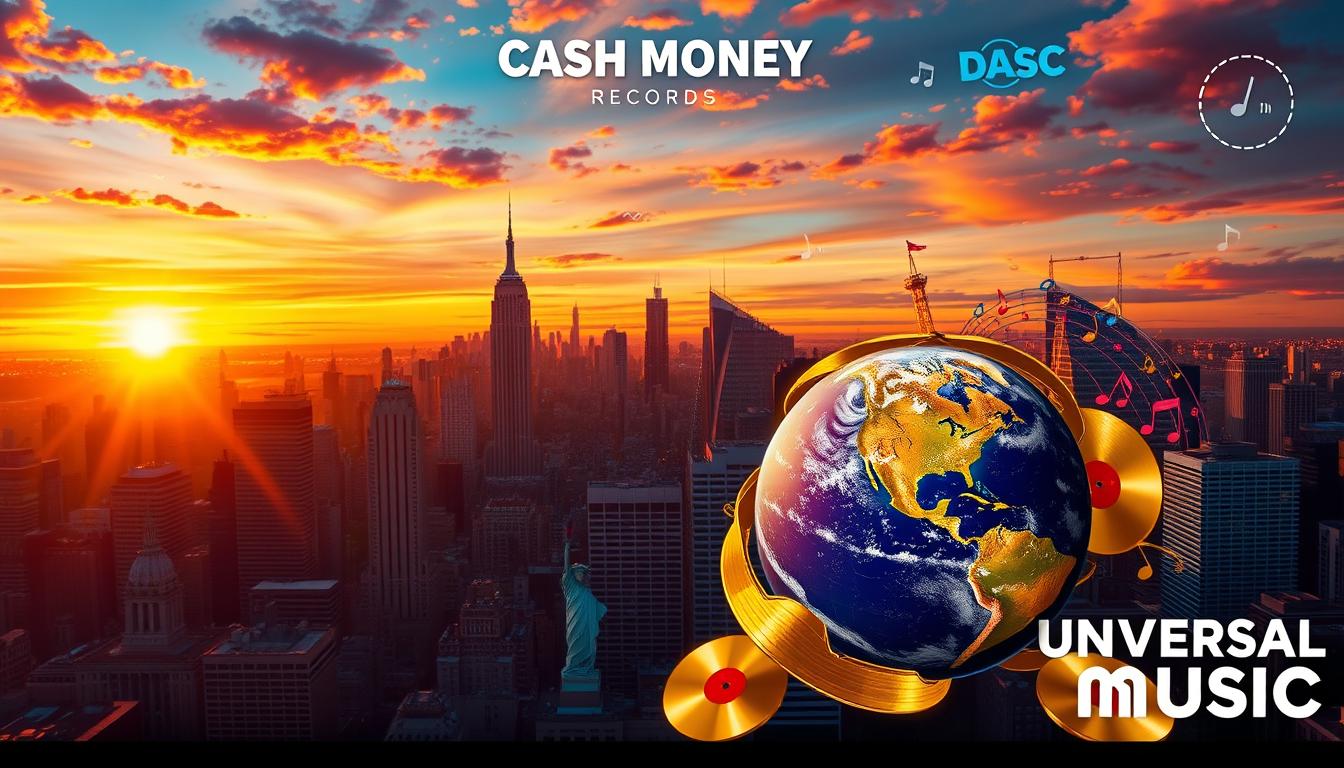When Did Cash Money Records Take Over Universal Music
“The secret of getting ahead is getting started.” – Mark Twain
Cash Money Records has a story that grabs your attention. This New Orleans label was started by brothers Bryan “Birdman” Williams and Ronald “Slim” Williams. They went from the projects to the top of the music world.
Their success shows the power of vision, hard work, and smart business moves.
Key Takeaways
- Cash Money Records was founded by brothers Bryan “Birdman” Williams and Ronald “Slim” Williams in New Orleans in the 1990s.
- The label’s early success was rooted in its deep ties to the local music scene and its innovative marketing strategies.
- Cash Money’s groundbreaking deal with Universal Music Group in the late 1990s marked a pivotal moment in the label’s history, propelling it to new heights of success.
- The Williams brothers’ business acumen, negotiation tactics, and industry relationships played a crucial role in Cash Money’s meteoric rise.
- Cash Money’s artist roster evolved and expanded, with the label becoming a dominant force in the hip-hop industry.
The Origins of Cash Money Records in New Orleans
Cash Money Records, a famous rap label, started in New Orleans. Brothers Bryan and Ronald Williams founded it in the early 1990s. They grew up in the city’s projects, where they learned to be entrepreneurs.
Early Days in the Projects
Bryan and Ronald Williams, known as “Birdman” and “Slim,” grew up in New Orleans’ poor areas. They saw the local rap scene’s energy and talent. This inspired them to help emerging artists.
Bryan and Ronald Williams’ Vision
The Williams brothers wanted to give artists a chance to show their talent. They founded Cash Money Records. Their goal was to make a mark in the rap record labels in new orleans and the cash money records origins.
The Local Music Scene Impact
Cash Money Records changed New Orleans’ music scene. It supported local talent, helping them reach success. This made New Orleans known for its hip-hop and influenced the nation.
“We wanted to create something that was ours, something that would represent our community and give our artists a chance to shine.” – Bryan “Birdman” Williams, Co-Founder of Cash Money Records
What Year Did Cash Money Take Over the Industry
The beginnings of Cash Money Records started in the early 1990s in New Orleans, Louisiana. But it wasn’t until the late 1990s that they really made their mark. In 1998, Cash Money Records made a move that would make them a major player in music.
That year, they struck a landmark deal with Universal Music Group. This was a huge deal for Cash Money. It gave them the resources and network to boost their artists’ success.
- The 1998 Universal deal was a turning point for Cash Money Records.
- It gave them access to Universal’s vast resources and global channels.
- This partnership helped Cash Money’s artists reach new heights of success.
With Universal’s support, Cash Money expanded its reach and signed talented artists. These artists became famous names. The label’s innovative approach and talent spotting made it a major player in music.
The 1998 deal with Universal was a key moment for Cash Money Records. It set the stage for their rapid rise and lasting impact on music.
The Rise of Cash Money Before Universal
Before the Universal Music deal, Cash Money Records was growing fast. Bryan “Birdman” Williams and Ronald “Slim” Williams had big plans. They used smart marketing to reach beyond their local area.
Building a Regional Empire
In New Orleans, Cash Money started small but grew big. The Williams brothers knew the local music scene well. They signed artists like Lil Wayne and Juvenile, who connected with the community.
Independent Success Stories
Cash Money’s artists started to make waves. Juvenile’s “400 Degreez” and Lil Wayne’s “Tha Block Is Hot” were hits. These successes showed the label’s knack for finding and supporting talent.
Marketing Strategies That Worked
Cash Money’s marketing was key to their success. They held local events and engaged with fans. They also used radio and collaborations to spread their artists’ music.
Thanks to their hard work, Cash Money became a major player. The Universal Music deal would soon make them even bigger.
| Key Milestones | Year |
|---|---|
| Cash Money Records founded by Bryan “Birdman” Williams and Ronald “Slim” Williams | 1991 |
| Juvenile’s “400 Degreez” becomes a regional hit | 1998 |
| Lil Wayne’s “Tha Block Is Hot” released, further cementing Cash Money’s local success | 1999 |
| Cash Money establishes its national presence and secures the Universal Music deal | 1998-2000 |
The Groundbreaking Universal Music Deal
The partnership between Cash Money Records and Universal Music Group was a turning point. Led by Bryan “Birdman” Williams, it made Cash Money a major player in music.
In the late 1990s, they made a deal. Universal Music Group got a big share of Cash Money Records. This gave the label the tools and global reach of a big company, boosting their artists’ success.
- The deal let Cash Money Records use Universal’s marketing power. This brought their artists to more fans.
- It also gave them access to Universal’s wide distribution network. So, their music could reach fans all over the world.
- Plus, Universal’s money helped Cash Money Records grow. They could invest in their artists and business.
This partnership was huge for Cash Money Records. It helped them become a top name in hip-hop. Artists like Lil Wayne, Drake, and Nicki Minaj became stars under their label.
“The Universal deal was a game-changer for us. It allowed us to take the label to the next level and solidify our position as a major force in the music industry.”
The partnership between Cash Money Records and Universal Music Group changed the label’s luck. It also changed the hip-hop world. It opened the door to a new era of success and creativity.
Bryan “Birdman” Williams’ Business Acumen
Bryan “Birdman” Williams, co-founder of Cash Money Records, is known for his sharp business skills. His negotiation tactics, leadership, and wide network have helped the label succeed. These efforts have made Cash Money Records a standout in the music world.
Negotiation Tactics
Birdman’s skill in making deals has been key to Cash Money’s growth. He finds new talent and takes smart risks. His negotiation skills help secure good contracts, keeping the label financially strong.
Leadership Style
Birdman leads with a focus on excellence and support for his artists. He manages each artist closely, building trust and loyalty. This approach helps his artists thrive and keeps the label popular.
Industry Relationships
Birdman has built a wide network in the music industry. His ability to form alliances has helped Cash Money secure deals and expand. These connections open up new opportunities, keeping the label ahead.
Birdman’s negotiation skills, leadership, and network have fueled Cash Money’s success. His efforts have made the label a major player in the music industry.
Cash Money’s Artist Roster Evolution
The story of cash money records history is tied to its artist roster’s growth. Founded in rap record labels in new orleans, Cash Money Records has found and grown some top hip-hop artists.
In the beginning, the label focused on New Orleans talent. Juvenile and B.G. were key, setting Cash Money’s sound. As it grew, it signed artists from all over, like Lil Wayne, a huge name in rap.
The Universal Music deal in the late 1990s helped Cash Money attract more stars. This led to hits from Nicki Minaj, Drake, and Tyga, making the label a major force in rap.
Over time, Cash Money’s artists have changed, showing hip-hop’s growth. The label keeps finding new stars, proving it’s a key player in rap record labels in new orleans.
| Artist | Years with Cash Money | Notable Releases |
|---|---|---|
| Juvenile | 1993 – 2001 | “400 Degreez”, “Tha G-Code” |
| B.G. | 1993 – 2003 | “Chopper City in the Ghetto”, “Livin’ Legend” |
| Lil Wayne | 1995 – present | “Tha Carter” series, “No Ceilings” |
| Nicki Minaj | 2009 – 2017 | “Pink Friday”, “The Pinkprint” |
| Drake | 2009 – 2012 | “Thank Me Later”, “Take Care” |
The growth of cash money records history artist roster shows the label’s talent spot. It’s a top rap record labels in new orleans in hip-hop history.
Financial Impact of the Universal Partnership
The partnership between Cash Money Records and Universal Music Group changed everything. It opened up new ways to make money, improved how they got their music out, and reached more people. This was a big win for the label.
Revenue Streams
With Universal, Cash Money’s artists could reach fans all over the world. They made more money from album sales, downloads, and streams. This helped the label earn more overall.
Distribution Benefits
The deal with Universal gave Cash Money better ways to share their music. It made it easier to get their songs to listeners everywhere. This helped the label promote their artists better, leading to more sales and fans.
Market Expansion
The Universal partnership helped Cash Money reach new places, like international markets. This let their artists connect with fans outside New Orleans. It was a chance for the label to grow and succeed in different ways.
The Universal partnership was a turning point for Cash Money Records. It set them up for huge success in the music world. Thanks to Universal’s help, Bryan “Birdman” Williams and his team became a major force in the industry.
Competition with No Limit Records
In the 1990s, New Orleans’ rap scene grew, with Cash Money Records and No Limit Records leading the way. These two labels became rivals, shaping Southern hip-hop and leaving a lasting impact.
No Limit Records, started by Master P, gained fame around the same time as Cash Money. Both labels aimed at the same audience, creating a fierce competition. Fans and critics argued over which label was better, adding to the legend of no limit records vs cash money.
“It was a battle for the soul of New Orleans rap,” recalls industry veteran DJ Jubilee. “Cash Money and No Limit were like two sides of the same coin, each vying for dominance in the rap record labels in new orleans.”
The battle between the labels was intense. They used creative marketing and signed big names to outdo each other. This led to a rich collection of music from both sides, showcasing Southern hip-hop’s growth.
The rivalry made New Orleans’ music scene more famous. Artists from both labels gained national attention. The fight between Cash Money and No Limit remains a key part of no limit records vs cash money history and hip-hop’s evolution in the South.
Cash Money’s Innovative Business Model
The rise of Cash Money Records is more than just their hits. Bryan “Birdman” Williams and Ronald “Slim” Williams changed the game. They created a new way to develop and pay artists.
Artist Development Strategy
Cash Money focused on growing local talent from New Orleans. They didn’t just sign stars. They shaped artists to fit their vision, building loyalty and creativity.
- Hands-on mentorship and guidance for artists
- Emphasis on honing skills and developing a distinct musical identity
- Collaborative production and songwriting process
Revenue Sharing Structure
Cash Money’s model was unique. They didn’t follow the usual record label way. Instead, they shared profits fairly.
- Artists got a bigger cut of royalties and album sales
- Transparent financial reporting and accountability
- Shared risk and reward, aligning the interests of the label and its artists
This strategy motivated artists to work hard. It also built trust and teamwork within the label. The history of Cash Money Records and Bryan Williams Cash Money strategies are still studied today.
Global Expansion Under Universal
The partnership between Cash Money Records and Universal Music Group was a game-changer. It opened doors for the label to grow globally. With Universal’s help, Cash Money Records history spread its wings, reaching fans worldwide.
Cash Money worked with artists and music execs from everywhere. This move brought in fresh sounds and fans. What year did cash money take over the scene, their artists went on big tours. This brought their music to new places and built a global fanbase.
They also used Universal to get their music out there. This move brought in more money and fans. It made Cash Money a big name in the global music world.
“Our partnership with Universal allowed us to take Cash Money to the next level, both domestically and internationally,” said Birdman, co-founder of Cash Money Records. “We were able to connect with fans worldwide and share our unique sound and artist roster with a global audience.”
The growth of Cash Money Records history under Universal showed the label’s smart moves. It proved they were adaptable and focused on quality. This move made the label stronger and more influential in the music world.
Digital Era Adaptation and Success
Cash Money Records led by Bryan “Birdman” Williams showed great agility and innovation in the digital music world. They used new digital platforms and marketing to stay on top. This helped them keep their success in the changing music scene.
Cash Money Records was quick to adapt to streaming platforms. They saw how music listening was changing and adjusted their plans. By working with streaming services, they became leaders in the digital music world.
The label also excelled in social media marketing. They used social platforms to talk directly to fans, boost their artists’ visibility, and create engaging content. This helped them stay relevant and strong online.
| Year | Digital Revenue (in millions) | Percentage of Total Revenue |
|---|---|---|
| 2015 | $35.2 | 42% |
| 2017 | $47.1 | 51% |
| 2019 | $59.4 | 60% |
The data shows Cash Money Records grew their digital revenue over the years. This proves they successfully adapted to the digital era. Cash Money Records and Bryan “Birdman” Williams kept their leading role in the music industry’s changes.
Conclusion
The story of Cash Money Records’ rise is a testament to the Williams brothers’ vision and hard work. Starting in New Orleans’ projects, they built a regional powerhouse. This eventually led to a landmark partnership with Universal Music Group in the late 1990s.
This year marked a key moment for Cash Money. Their innovative approach, artist development, and marketing led to huge success. The Universal Music deal helped them reach a global audience and boosted their artists’ careers.
Cash Money’s influence on the music industry is still felt today. Their approach to revenue sharing and empowering artists has set a new standard. As the industry changes, Cash Money’s story remains a guide for those aiming to succeed in music.
FAQ
When did Cash Money Records take over Universal Music?
Cash Money Records made a groundbreaking deal to take over Universal Music. This deal changed the hip-hop industry.
What were the origins of Cash Money Records in New Orleans?
Cash Money Records started in the early 1990s in New Orleans. Brothers Bryan “Birdman” Williams and Ronald “Slim” Williams founded it. It began small but grew into a major force.
What year did Cash Money take over the industry?
Cash Money Records made a big move in a specific year. This marked a key moment in their rise.
How did Cash Money build their empire before the Universal deal?
Before the Universal deal, Cash Money built a regional empire. They achieved success on their own and used smart marketing. These efforts helped them grow.
What were the details of the groundbreaking Universal Music deal?
The deal between Cash Money Records and Universal Music was a big deal. It had big effects on both companies and the hip-hop world.
What was Bryan “Birdman” Williams’ business acumen?
Birdman’s negotiation skills, leadership, and industry connections were key. They helped Cash Money succeed and form the Universal partnership.
How did Cash Money’s artist roster evolve over time?
Cash Money’s artist lineup changed a lot. They signed new artists, had breakout stars, and made roster changes before and after the Universal deal.
What was the financial impact of the Universal partnership for Cash Money?
The Universal partnership brought Cash Money new money, better distribution, and growth chances. It greatly changed their finances.
How did Cash Money compete with No Limit Records?
Cash Money and No Limit Records, both from New Orleans, competed fiercely. Their rivalry shaped the Southern hip-hop scene and their success.
What was Cash Money’s innovative business model?
Cash Money had a unique approach. They focused on artist development and shared revenue. This made them stand out in the industry.
How did Cash Money expand globally under Universal?
The Universal partnership helped Cash Money grow worldwide. They entered new markets and made global collaborations to increase their influence.
How did Cash Money adapt to the digital era?
Cash Money Records thrived in the digital age. They used streaming, social media, and stayed relevant in a fast-changing industry.





